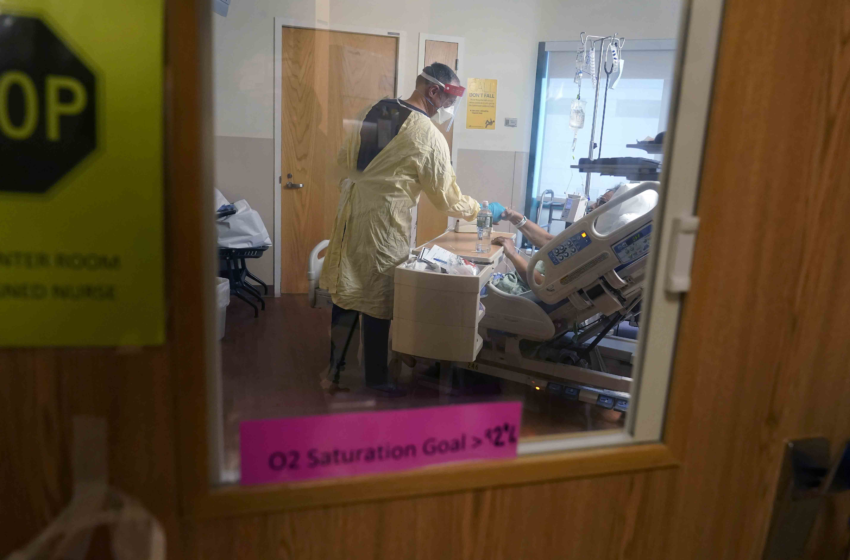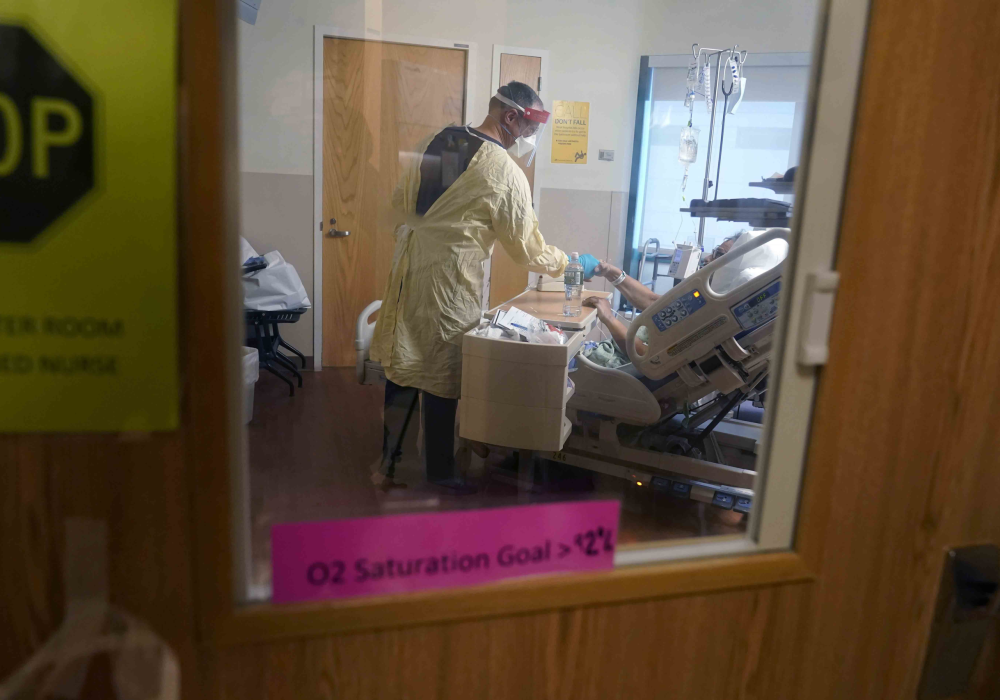While most health workers are vaccinated, many are still falling sick, exacerbating a staff shortage as more Americans seek hospital care. The reliance on employees who may still be infectious comes despite objections from nurses‘ unions and the American Medical Association, which warned the decision puts patients’ health and safety at risk. And there are no requirements that patients be notified if their caregiver is sick.
Still, the practice is happening across the country. In New Jersey, a nurse was recently instructed to come to work despite concerns that she had contracted Covid-19, according to a union representative. In Rhode Island, a nursing home and state-run hospital system recently used workers who tested positive after the state updated its guidelines in accordance with the CDC. In Missouri, a hospital is bringing back nurses after five days as long as they are asymptomatic. Health care workers around the country have reported that they are being called in to work even if they suspect they are infectious.
“It’s comparable to March, April, May 2020. I have not seen health care workers as panicked as they are now since that time,” said Debbie White, a registered nurse and president of New Jersey’s largest health care union, HPAE, which opposes the CDC’s guidance.
In interviews with several hospital executives, health care workers and health officials, nearly all said they are following the CDC’s new advice. That guidance, released last month, allows facilities to bring back workers after five days of isolation, instead of 10, without a negative Covid-19 test. In cases where workforce shortages become extreme, hospitals can bring back staff without any isolation period.
Chip Kahn, a lobbyist and president of the Federation of American Hospitals, said hospitals were generally pleased with the CDC’s new guidance because of the flexibility it allows them to decide when to bring workers back. Some public health experts also support the measure, noting the importance of keeping health systems running to treat Americans’ illnesses as the surge in Omicron cases crests.
Celine Gounder, an infectious disease expert at New York’s Bellevue Hospital who advised President Joe Biden’s transition team, said her hospital has moved to a five-day isolation period for workers. The hospital requires doctors and nurses to wear N-95 masks, among the highest grade protection available, regardless of whether they were previously infected. “If people are truly wearing their mask,” she said, “I think it’s very low risk.”
There are concerns for some of the most vulnerable patients, however, particularly those that don’t respond well to vaccines, like the immunocompromised and many cancer patients. Exposing vulnerable patients or older residents in long-term care facilities is dangerous because vaccines don’t necessarily protect those with compromised immune systems.
“We don’t think anyone who is knowingly Covid positive should be interacting with a cancer patient,” the American Cancer Society’s CEO, Karen Knudsen, told POLITICO.
The CDC recommends, though doesn’t require, health providers to tell patients if an infected worker spends more than 15 minutes with them at a distance of less than six feet. Many health experts say transmission can occur in less time and distance.
None of the hospitals POLITICO contacted responded when asked whether patients are informed if a caregiver was recently infected.
Jennifer Caldwell, an ICU nurse at the Research Medical Center in downtown Kansas City, Mo., said her hospital changed its guidance soon after the CDC’s update, allowing workers to return to work after five days provided they are asymptomatic. “It feels extremely irresponsible because you’re asking us to work sick,” she said. “The science shows that just because you’re asymptomatic doesn’t mean that you’re not infectious.”
A spokesperson for the hospital, Christine Hamele, confirmed the five-day rule and said staff “do not return to work if they are an infection risk with symptoms.”
She added, “Our return-to-work guidelines for colleagues with Covid-19 are consistent with CDC guidance.”
The CDC’s new guidance also allows health care facilities facing “crisis” levels of staffing to keep infected workers on the job without isolation but it’s the facilities — not the CDC — that determine whether they’ve met that level, an agency spokesperson said. It couldn’t immediately be determined how many facilities are employing this practice.
Executives and health officials told POLITICO they hope they will not have to resort to the more drastic measure — though they couldn’t be sure, given the severity of the Omicron surge.
In Washington state, hospitals are stretched but not to the point of allowing workers to stay on the job without isolating first for five days, the state’s secretary of health, Umair Shah, told POLITICO last week. But that could change, he said. Staffing is precarious. “The next several weeks will be very difficult for our state,” he said.
Washington’s health centers are generally allowing staff that test positive to return after five days without a negative test, he said. Hospitals aren’t required to notify patients or other workers that a staffer recently tested positive, according to a state spokesperson.
Hospitals’ decision to not require a negative test before returning is partly due to the nationwide testing shortage, according to Elnahal, the CEO of the Newark hospital, which doesn’t require workers to test negative before returning after a five-day isolation.
“We have long lines outside of our testing clinic for patients and families, and if I had to disproportionately keep testing my employees to bring them back to work, that would compromise access to testing for the community,” he said.
Governors including those in Arkansas, Georgia, Ohio, Oregon and Pennsylvania have called up hundreds of National Guard to assist hospitals, though they aren’t necessarily medically trained, according to a National Guard spokesperson.
Elnahal said his hospital had requested federal support, mostly from the Federal Emergency Management Agency, though he is doubtful the program will make a meaningful impact. “We are not optimistic that enough people will be available from the federal government,” he said.
Some hospitals are choosing not to reduce isolation periods for staff, even when worker shortages are leading to cancellations of procedures. Since December, University of Michigan Health has postponed more than 200 surgeries due to a lack of available beds and staff shortages, according to a spokesperson.
Maggie Frye, an associate professor of sociology at University of Michigan, said the shortage forced the hospital to postpone her 5-month-old son’s heart surgery, though it was later rescheduled and proceeded, after much uncertainty.
The spokesperson said Michigan Health has maintained its 10-day isolation requirement for employees who test positive. It doesn’t plan to change its policy.
“Speaking only as a mother, I was relieved to hear this,” Frye said. “It would be very dangerous for my son to be exposed to Covid during his recovery.”










